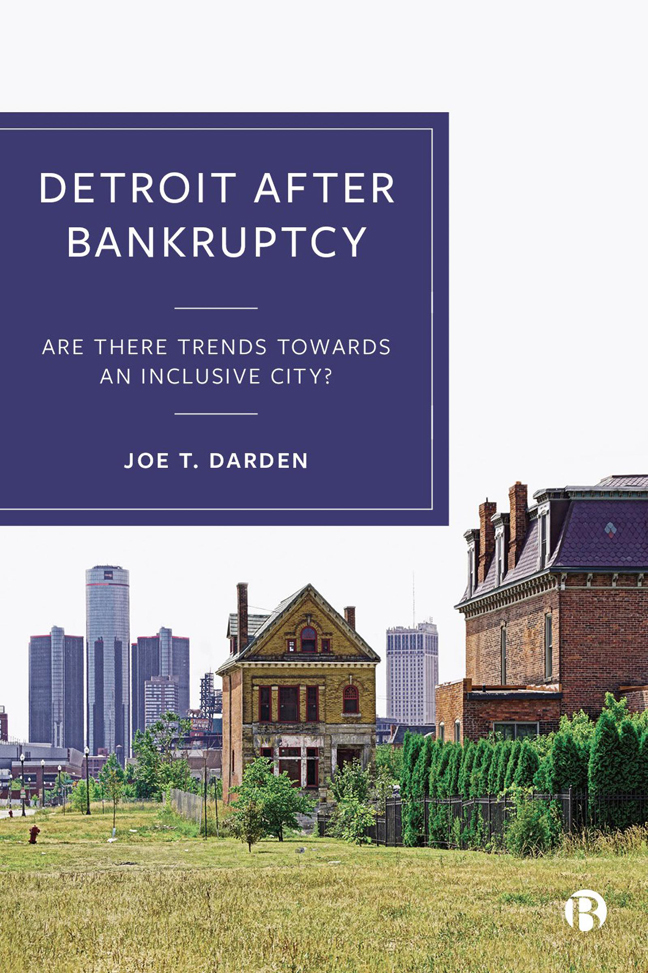Book contents
- Frontmatter
- Dedication
- Contents
- List of Figures and Tables
- Acknowledgments
- Preface
- 1 Antecedents to Bankruptcy
- 2 Detroit Bankruptcy: The Characteristics of the Decision Makers and the Differential Benefits Afterwards
- 3 The Postbankruptcy Social and Spatial Structure of Metropolitan Detroit: Anatomy of Class and Racial Residential Segregation
- 4 Gentrification: A New Method to Measure Where the Process Is Occurring by Neighborhood
- 5 The Uneven Distribution of Economic Redevelopment: Which Neighborhoods Are Excluded?
- 6 Black and Hispanic Underrepresentation in Business Ownership in a Majority-Black City
- 7 Racial Inequality in Student Academic Achievement Levels: A Neighborhood Solution to the Problem
- 8 Unequal Exposure to Crime in the City of Detroit: A New Method to Measure Exposure by the Characteristics of Neighborhoods
- 9 Solving the Problem of Extreme Race and Class Inequality: Implementing the Spatial Mobility Alternative
- 10 Conclusions: The Status of the Residents of Detroit after Bankruptcy
- References
- Index
6 - Black and Hispanic Underrepresentation in Business Ownership in a Majority-Black City
Published online by Cambridge University Press: 25 January 2024
- Frontmatter
- Dedication
- Contents
- List of Figures and Tables
- Acknowledgments
- Preface
- 1 Antecedents to Bankruptcy
- 2 Detroit Bankruptcy: The Characteristics of the Decision Makers and the Differential Benefits Afterwards
- 3 The Postbankruptcy Social and Spatial Structure of Metropolitan Detroit: Anatomy of Class and Racial Residential Segregation
- 4 Gentrification: A New Method to Measure Where the Process Is Occurring by Neighborhood
- 5 The Uneven Distribution of Economic Redevelopment: Which Neighborhoods Are Excluded?
- 6 Black and Hispanic Underrepresentation in Business Ownership in a Majority-Black City
- 7 Racial Inequality in Student Academic Achievement Levels: A Neighborhood Solution to the Problem
- 8 Unequal Exposure to Crime in the City of Detroit: A New Method to Measure Exposure by the Characteristics of Neighborhoods
- 9 Solving the Problem of Extreme Race and Class Inequality: Implementing the Spatial Mobility Alternative
- 10 Conclusions: The Status of the Residents of Detroit after Bankruptcy
- References
- Index
Summary
Introduction
Before and during bankruptcy, Black and Hispanic business owners were extremely underrepresented compared to their populations in the City of Detroit. This chapter examines both Black-owned and Hispanicowned businesses.
Black-owned businesses nationwide: previous studies
As far back as 2007, I conducted research on Black business development in Michigan (Darden, 2007). Past research revealed that Black-owned firms in Detroit and other cities in Michigan were suffering from limited market size, as was the case in the US as a whole. In other words, most Black-owned businesses relied on Black consumers to remain in business. Other researchers came to the same conclusion (Fairlie and Robb, 2007a).
According to Bates (1993), such racially restrictive markets were due to racial residential segregation and discrimination. He noted that white merchants continued to open stores in Black neighborhoods, but Black merchants were historically excluded from white neighborhoods. The typical Black business was characterized as a small business concentrated in predominately Black neighborhoods. The socioeconomic characteristics of the Black neighborhoods were very low. Throughout the early period, before the Civil Rights Acts of the 1960s and based on data going up to 2002, Blackowned businesses continued to experience limited access to capital, which influenced the size, location, and type of such businesses. This lack of capital also influenced the type of Black-owned business. Research revealed that firms in construction, manufacturing, and wholesale trade usually required a larger amount of capital than small personal service businesses and retail establishments (Ong, 1981). As a result, fewer Blacks are represented in these types of firms (Darden, 2007).
Research also suggests that the limited access of Blacks to capital is related to the higher loan denial rates Black business owners have experienced even after controlling for differences in creditworthiness (Cavalluzzo et al, 2002). It has also revealed that Black business owners were required to pay higher interest rates or put down more collateral than white business owners (Fairlie and Robb, 2007a). The limited access to capital forced Blacks into types of businesses with higher turnover rates, such as small retail (Reynolds and White, 1997; Robb and Fairlie, 2007b). Bates (1997) noted that fewer Black-owned businesses compared to white-owned businesses obtained a larger supply of capital to open manufacturing and wholesale businesses, which have lower turnover rates. Also, a lower supply of human capital influences failure rates and reduces the amount of profits (Darden, 2007).
- Type
- Chapter
- Information
- Detroit after BankruptcyAre There Trends towards an Inclusive City?, pp. 98 - 116Publisher: Bristol University PressPrint publication year: 2023

